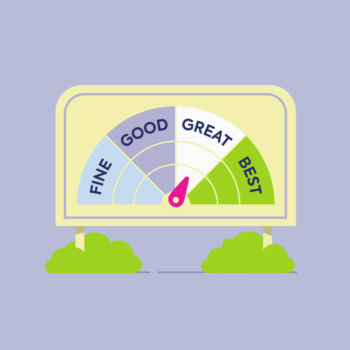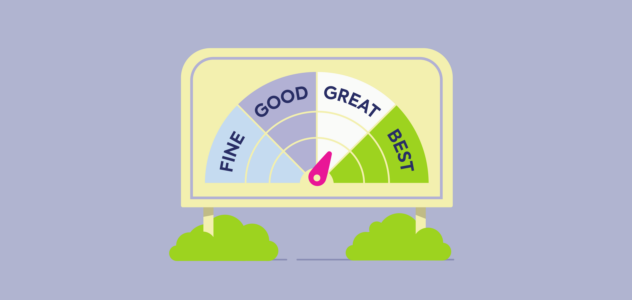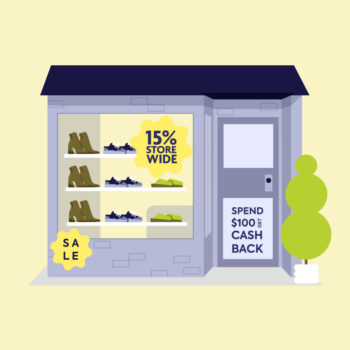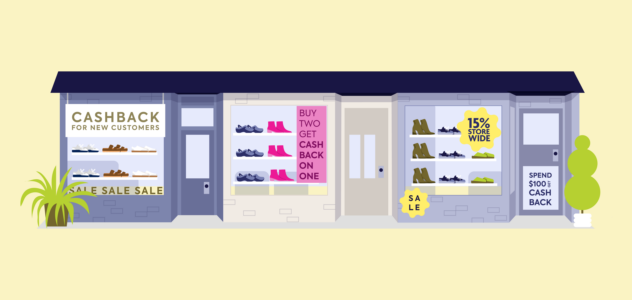Real talk: you’re not locked into one home loan forever.
Think of it more like a casual job. You know, one you’re totally committed to… Buuuuuut you’re also free to leave at any time if another (more appealing) option comes along.
We’re talking about refinancing.
Refinancing is when you renegotiate or replace your current mortgage with a new one in a way that works out better for YOU. It can be with your current lender or an entirely new one.
Maybe you’ve had your home loan for a few years, you’d like to tap into some equity or you’re preparing for a change in interest rates. Whatever your reason, refinancing is all about landing a better deal so you can reach your goals. Sooner.
So when should you refinance? How often should you refinance your home? And is there anything else to consider before you make the switcheroo?
When should you refinance your mortgage?
The telltale signs
Ok, there’s no textbook formula that determines when you’re ready to refinance.
Because the truth is, everyone’s situation is Unique with a capital U.
But if you’ve ever caught yourself saying any of the following — or something along these lines — it might be a good time to explore refinancing…
Note: The info in this article needs to be considered a little differently if you are on a fixed rate loan. In this case, we always suggest you speak with a broker if you are thinking about refinancing during the fixed rate period.
“How about those interest rates, hey?”
You know how it goes. One second you’re young and fun, and the next? You’re bringing up interest rates over a casual drink with friends.
But hey, if you noticed there’s a lower rate out there (or your friends are on a lower rate) it could be a good time to weigh up refinancing. Even finding a loan that’s a fraction of a percentage lower than your current rate could save you thousands over the life of your loan. Not only that, by switching lenders you could find options with less (or no) fees.
“I can’t even remember what my interest rate is!”
When you buy a property it can all happen so fast… Sign this dotted line… Sign that dotted line… So if you don’t *exactly* remember what interest rate you settled for, that’s totally understandable.
Logging in to your lender’s app or website should help you find what your current rate is.
“The property market has gone bananas!”
If you suspect your property has increased in value over recent years, refinancing may allow you to move to a lower rate and access some equity (AKA the difference between the value of your property and the size of the loan you have on that property).
Plus, some lenders do a thing called “pricing for risk” which basically means they give you an interest rate based on the risk for them to lend you money (yep, it could mean a higher rate for first homeowners who purchased at a high loan to value ratio – eg. with a deposit of less than 20%).
The good news? Many first homeowners who fall into this category can secure a lower rate when their property value goes up. Boom.
“Gee I’d love to renovate this place soon”
Need more space? Does that 70s vibe need to go? Or could the whole place do with a freshen up?
Well, did you know you can use the equity in your home to fund a renovation?
Yep. And you can potentially access that equity by — you guessed it — refinancing.
“I want to buy another property”
A lot of property owners don’t stop at one. Having an investment property could help with cash flow or help set you up for the future.
So if buying another property is on the cards for you, then refinancing can allow you to access the equity in your current property to help fund your new one. See how Aleks (Broke Girl Wealth) did exactly that!

“It’s time I got a new car”
Just like you can use equity to renovate or buy a new property, you can also use equity to buy a car (or any other asset for that matter).
Pay down bills, fund a holiday, throw a dream wedding — the list goes on.
“I’m making more money now — booyah!”
Are you working more? Did you get a promotion? Or did you land that DREAM job?
When you’re earning more money, it’s a good time to check in with your home loan because you may be eligible for a different loan, or choose to increase your repayments to match your new income. And ultimately? This means you’ll pay off your home loan faster… Stopping all stations to debt-free!
“Ooh that’s a juicy cashback offer”
A cashback offer is sometimes as good as it sounds. It’s when lenders throw money at you just for switching your home loan to them (sometimes it’s up to $3,000^).
But it’s good to remember there are also costs involved in refinancing (like government and bank termination fees). But these costs can often be outweighed by potential savings and juicy cashback offers, so worth exploring.
“I got a new job!”
A new job often comes with a shiny new paycheck. So remember to check in with your home loan to see if your current loan and repayments are still *working* for your new situation. Even if you’re moving to casual employment, switching industries or switching for equal (or less) pay — it doesn’t mean refinancing is off the table. It could still be beneficial for you (and worth checking).
“We’ve got a kid on the way”
First of all, congratulations!
Second of all, a lot of homeowners choose to refinance whenever there’s a slight change to their current circumstances (and yes, a new tiny human falls into that category). This is because a change in your spending habits (ahem, more nappies) or earning capacity can mean your current loan and repayments are no longer the right fit. Remember, your home loan should always evolve with your lifestyle.
“I lost my job”
If you’ve quit your job, been made redundant or are currently unemployed, the repayments you were once making may no longer be suitable. This is a good time to check in with your broker to see what other options are out there.
“Yikes, looks like my fixed rate is due to expire”
A fixed rate home loan is when your interest rate and repayments stay the same for a predetermined period. But when this period runs out, you can get caught out paying a much higher rate. Sometimes the rate is even higher than the bank’s new clients — hellooo loyalty tax.
Reassess your situation a few months before your fixed rate expires to avoid a potential increase in your interest rate.
“It’s been a few years since I last refinanced”
Time flies when you’re a homeowner, doesn’t it? And are you guilty of working through the motions without stepping back to evaluate things?
Even if you haven’t needed to access equity or had any major changes to your situation, it could be a good idea to refinance every few years. Why? Because you never know what savings could be up for grabs.
What’s the catch? What else should I consider before refinancing?
There are a few things to consider before you dip your toe into the pool of refinancing…
Costs
There’s no such thing as a free lunch. There are sometimes fees associated with refinancing, like government fees, bank termination fees and break fees. The good news? These fees are often outweighed by the potential savings.
Lenders Mortgage Insurance (LMI)
Lenders Mortgage Insurance is the insurance that lenders often take out when you’re borrowing more than 80% of a property’s value (it’s to cover them in case things go bad). These costs are then passed on to you. At first, it may seem silly to refinance *into* a loan with LMI, but there are some situations where it makes sense to homeowners.
Do you have a broker?
A mortgage broker is your ultimate wing person. They’re the go-between you and a lender, helping you get a better deal — from identifying your needs to the back-and-forth with your chosen bank (phew). Having a mortgage broker on your team makes the process of refinancing a whole lot less scary.
Finally, there’s no such thing as refinancing too many times
If you’re wondering “how often is too often to refinance?” Well, the answer doesn’t exist because there’s no legal limit. Yep, you can refinance as many times as you like. And if you use the situations above as a guide on when to refinance, you’re on the right track.
Common refinancing questions
Can I refinance if I’ve had my loan for less than one year?
Yes, you can refinance within the first year of your home loan. We recommend speaking with a broker (like Finspo!) to see if it stacks up in your favour.
Can I refinance more than once a year?
Yep, there’s no legal limit to this. But given refinancing comes with a few fees, make sure you weigh up whether this is right for you with help from an expert.
Should I bother refinancing if I only have a few years left on my loan?
It depends. This is when you need to do some maths to work out whether you’ll break even or see the benefits. A mortgage broker should be able to help you make the right call for your situation.
When is it worth it to refinance? Are all the fees worth it?
We can’t speak for *every* situation. But in many cases, yes, the fees are worth it. You may see these fees as a small hurdle to saving money rather than a roadblock. Learn more about the costs of refinancing.
Should I refinance with my current lender or a new one?
You can refinance with both your current lender or an entirely new one. The path you choose will depend on your situation and the offers they put on the table. If in doubt, speak to a broker.

So, when should you refinance?
Truth is, there’s no straightforward answer because every situation is different.
Buuuuut to give you a rough idea, the average home loan duration for Australians is 4-5 years* and refinancing makes up a large part of this.
So if you’ve had your home loan for about that long — or you found yourself nodding along to the situations above — then it’s a good time to start the conversation.
In many cases, refinancing is totally worth the effort (especially when you have a broker to do the heavy lifting for you).
You’ll be shocked at how easy the process is…
- Book an appointment with a Finspo expert (online, phew!)
- Tell us about yourself and provide any additional info
- We’ll present your options so you can choose your approach
Simple!
So what are you waiting for? Get started with Finspo today.
^Cashback offers from select lenders subject to eligibility criteria, terms and conditions.
*Finspo internal analysis of average Australian loan durations.


































